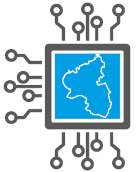Opinions from research, business and society on the topic of AI: a snapshot in Rhineland-Palatinate
-
In the context of a project carried out at the Department of Computer Science by the Machine Learning Working Group (Prof. Dr. Kloft) and at the Faculty of Social Sciences by the Department of Sociology (PD Dr. Rapp) supervised Master’s thesis, surveys were conducted among researchers, companies and society in Rhineland-Palatinate with reference to the domain of artificial intelligence in June 2023 with the support of the AI Alliance Rhineland-Palatinate project office at the RPTU location in Kaiserslautern.
Compressed results of this snapshot are summarised below.
-
Society sees no concerns with data use by science.
While researchers already see obstacles to obtaining data for training artificial neural networks, society has no concerns about this.
Depending on the allocation of the information derived from the data, possibilities of use may be hindered by protective rights (e.g. personal rights, industrial property rights and constitutional rights), which may have to be considered separately for the area of origin and the area of use of the data and require detailed legal examination. With regard to society protected by personality rights, however, the case may be comparatively simple, so that data protection – contrary to what is often assumed – does not prove to be an obstacle.
A proactive approach by researchers in obtaining data, supported by an enlightening social discourse and intensive cooperation with the central legal departments of the universities, as is already the case for the most part, would be beneficial here.
-
Competitive advantages through AI.
Benefits of making work processes more efficient and providing positive support for employees also have a positive impact on the financial situation in the long term, according to the companies’ view of the justification for their need for AI. This view is critically accompanied by society: It is feared that AI will be used primarily to maximise profits and that reservations about AI might therefore not be taken into account.
At what time a beneficial use of AI is possible in the company is likely to be a very individual decision. The fact that employees should be informed at an early stage and possibly also encouraged to participate in shaping and co-determining the entire process could therefore ultimately prove helpful. In the context of the use of AI, comprehensive communication strategies for external presentation should also be developed.
-
Two royal children: researchers and companies.
On the one hand, the majority of researchers already cooperate with companies and would also like to cooperate with companies even more frequently; on the other hand, the majority of companies have recognised their need for AI, but have never cooperated with researchers.
Research cooperation enables advantages for researchers and companies. It is also indispensable for applied research and strengthens the business location. The fact that researchers and companies naturally pursue different goals and do not speak the same language should not be an obstacle.
The transparent presentation of a research cooperation (e.g. project goals and duration, responsibilities, submission of project proposals, time and financial plans, ownership, exploitation and publication rights) could be helpful in clarifying the partners’ horizon of expectations. The transfer offices already installed at each university as well as the local chambers of industry and commerce could provide support here.
-
Ambivalent relationship to morality.
While from a societal perspective the use of AI should not be rejected in any research area and society also criticises that societal attitudes towards the use of AI are not taken into account by researchers, researchers reject the use of AI in some research areas and are certainly influenced by societal values.
These contradictory views could be caused by different evaluation standards, which could also be due to incomplete information about the effects of AI. It can be assumed that researchers who bring their findings to the attention of society in a variety of ways and in an appropriate, non-polarising form and language could contribute to resolving the contradiction.
-
Insufficiently informed society.
Researchers, even though they are qualified to teach people from outside the field, should do even more to communicate their research results, because there is a need for this in society, which is not sufficiently informed from both points of view.
The direct communication of information from current research to society helps in the understanding of complex interdisciplinary contexts and thus has the potential to lead to an enlightened discourse, which can provide a positive impulse for the acceptance of the technology. To this end, researchers could also offer appropriate information events in interdisciplinary small groups in cooperation with public institutions (e.g. municipal libraries, vocational schools, adult education centres, chambers of industry and commerce, master craftsmen’s schools) in the sense of a Studium generale.
-
Take into account the needs of the employees.
The concerns of employees about the use of AI, feared by entrepreneurs, are supported by the demand from society that the needs of employees be given top priority here.
Changed work processes without sufficient acceptance by the employees can quickly lose their effectiveness. Designing work processes together with the workforce and the co-determination bodies and providing comprehensive information and training at an early stage underlines the value of the staff, facilitates identification with the change and is suitable for dissolving initial reservations.
-
Society has concerns about data use by business.
The use of personal data in the context of AI applications in companies is viewed with scepticism by society.
AI can also be helpful in the context of processing personal data, such as selecting a job application or evaluating performance values. Such processing is subject to the data protection regulations to be taken into account.
Here, legally compliant transparency must be created in consultation with experts. A dialogue proactively initiated by the company should be able to dispel concerns. In addition, it should be examined to what extent anonymised data is sufficient for processing so that data protection can no longer be applied in this respect.
-
AI location advantage Rhineland-Palatinate.
Researchers and entrepreneurs agree that Rhineland-Palatinate is an attractive location for AI research and AI-using companies.
This may also be due to the eleven universities and universities of applied sciences with their internationally renowned researchers and the numerous research institutes, some of which are active beyond the region (such as the German Research Centre for Artificial Intelligence (DFKI) and the Fraunhofer Institute for Industrial Mathematics ITWM).
Further funding and investment can help to maintain and further develop this locational advantage, especially with regard to new developments in the use of artificial intelligence in biotechnology.
-
 The online surveys took place in June 2023. All professors (researchers) known to the AI Alliance Rhineland-Palatinate who are active in the AI domain were surveyed; the participation rate was 22 %. With the help of an external market research company, 108 from companies active in Rhineland-Palatinate were interviewed in a random sample. With the help of the market research company, 412 people aged 18 and over from society in Rhineland-Palatinate were also interviewed in a random sample. Only those opinions were evaluated here whose share comprised at least two out of three votes, i.e. corresponded to at least a two-thirds majority.
The online surveys took place in June 2023. All professors (researchers) known to the AI Alliance Rhineland-Palatinate who are active in the AI domain were surveyed; the participation rate was 22 %. With the help of an external market research company, 108 from companies active in Rhineland-Palatinate were interviewed in a random sample. With the help of the market research company, 412 people aged 18 and over from society in Rhineland-Palatinate were also interviewed in a random sample. Only those opinions were evaluated here whose share comprised at least two out of three votes, i.e. corresponded to at least a two-thirds majority.
The error of the first kind, that the sample is in fact a simple minority opinion, is a maximum of 3.07% in the field of research, a maximum of 0.03% in the field of economics and close to 0% in the field of society.
